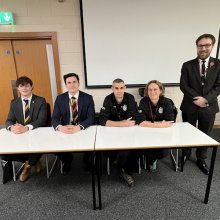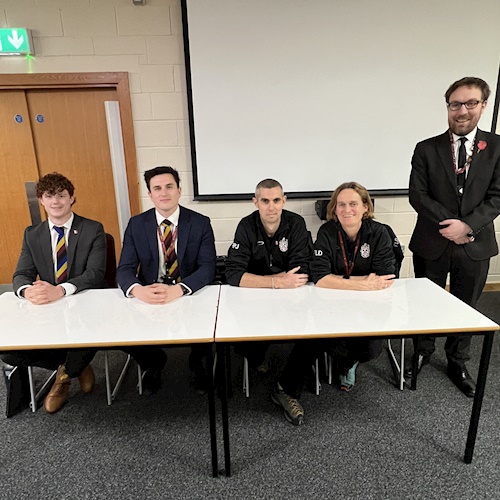
Following the success of our earlier Question Time-style debates, pupils in Years 10 and 11 took their turn to gather and hear a panel of teachers (and one pupil) tackle some of the big questions that have been stirring conversation around the College. Although both year groups explored similar themes - politics in sport, life as a teacher, screens, money, and more - their discussions took very different directions, offering a brilliant snapshot of how perspectives evolve across the College.
Year 10 Question Time: Mr Jones, Mr Elliott, Elliot Jones, and Mrs Dunn
Does politics have any role in sport?
Mr Jones kicked things off by noting that politics in sport is nothing new, referencing both Hitler’s manipulation of sport in the 1930s and Nelson Mandela’s unifying role in 1995. Sport can be used for good or bad, he said, depending on who’s holding the megaphone. Mr Elliott reflected on how many athletes and nations are affected by political decisions, citing the Olympics and the bans on Russian athletes. “It’s sad they can’t represent their country,” he said, adding that politics has an undeniable impact.
Elliot Jones argued that while politics shouldn’t be involved, the reality is different. Global events like the World Cup are watched by billions, making them irresistible platforms for political messages. Sport, in an ideal world, should be “impartial and about entertainment.” Mrs Dunn agreed that politics will always find its way into sport for better or worse. She pointed to the 2012 Olympics as an example of sport being used to inspire and empower people, showing the positive potential when politics is handled well.
What’s the best and worst thing about being a teacher?
Mr Elliott's favourite part was clear: helping pupils overcome challenges and seeing their progress. “It’s so rewarding,” he said. The hardest part? When pupils simply don’t want to try. Mr Jones echoed this, saying the best moments come when pupils go from not enjoying a subject to achieving strong results. The worst? Apathy. “When the teacher ends up caring more than the pupil,” he admitted.
Mrs Dunn took a longer-term view. The true reward, she said, is when ex-pupils return years later and explain how school shaped them. But the toughest moments are the honest, difficult conversations; the ones that break parents’ hearts and teachers’ too. Elliot Jones stepped in as the pupil voice, explaining that teachers’ strengths lie in their passion and ability to inspire. On the downside, teachers constantly have to adjust how they act depending on the age group. “Year 13 and Year 7 are completely different,” he said.
Year 11 Question Time: Mr Hindley, Miss Povey, Mr Cartwright, and Luca Hunt-Davis
Why are our screens being monitored in class? Is it about trust?
Miss Povey started by saying the issue wasn’t trust for trust’s sake. It was about helping pupils who slip into using devices in the wrong way, especially during prep or assessments. Monitoring is there to avoid the easy pull of distraction. Mr Hindley admitted the problem isn’t just pupils as even adults struggle. “It’s not about trusting you,” he said. “It’s about trusting ourselves. We’re all hooked.” Staff emails, he added, can be just as distracting.
Mr Cartwirght agreed that procrastination is universal, and screen monitoring is about supporting pupils, not catching them out. Luca, meanwhile, landed the classic truth bomb: “Some people will ruin it for everyone else.” When a few misuse screens, the whole group feels the consequences.
Does politics have any role in sport?
Miss Povey argued that politics does have a place, especially when athletes use their platforms to advocate for important values from women’s sport to wider societal issues. Mr Hindley focused on human rights, saying sport can play a powerful role in holding countries to account and ensuring basic standards are upheld.
Mr Cartwright agreed politics is already deeply embedded in international sport, even though many people prefer to watch for the love of the game itself. Those big arenas, he said, naturally become spaces for global values to collide. Luca offered a pragmatic take: in an ideal world, politics and sport would be separate but “we don’t live in that world.” Sporting bodies must step in when necessary, such as in doping scandals or serious human rights abuses.
Does having more money make us happier?
Miss Povey said it depends entirely on how much. Everyone needs enough to live a good life, but joy, ultimately, comes from relationships - friends and family - not bank balances. Mr Hindley argued that while lots of money won’t guarantee happiness, a lack of it can certainly create unhappiness. “You feel the absence more than the gain,” he said.
Mr Cartwright backed this up with the classic curve: happiness rises with income before levelling off and in some cases, dropping at very high levels when competition, comparison, and pressure creep in. Luca concluded that it isn’t really the amount that matters but rather how you spend it. Experiences, generosity, and stability beat material excess every time.









